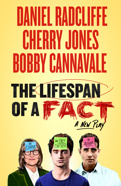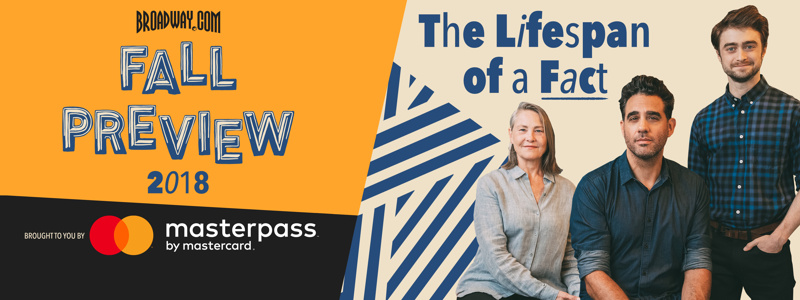
Cherry Jones, Bobby Cannavale & Daniel Radcliffe Explore Truth, Art and The Lifespan of a Fact

The fall theater scene is kicking into high gear with an exciting crop of plays, revivals and new musicals hitting the stage. The Broadway.com 2018 Fall Preview highlights the stars and shows of the new season.
The Lifespan of a Fact documents the seven-year journey from pitch to publication of John D’Agata’s essay, “What Happens There,” about the suicide culture of Las Vegas. The collaboration of three writers—Jeremy Kareken, David Murrell and Gordon Farrell—the new Broadway play is based on the acclaimed 2012 book of the same name by two writers—D’Agata and Jim Fingal, the fact checker who challenged the truthfulness of D’Agata’s reportage. Harry Potter icon Daniel Radcliffe, who has won five Broadway.com Audience Choice Awards for his New York stage work, plays Fingal, with two-time Emmy Award winner and two-time Tony Award nominee Bobby Cannavale playing D’Agata and two-time Tony winner Cherry Jones rounding out the cast as Emily, the editor who fights to keep the project moving along. With these three super-talents, The Lifespan of a Fact is sure to be a gotta-see theater event, and there’s nothing fake about that news.
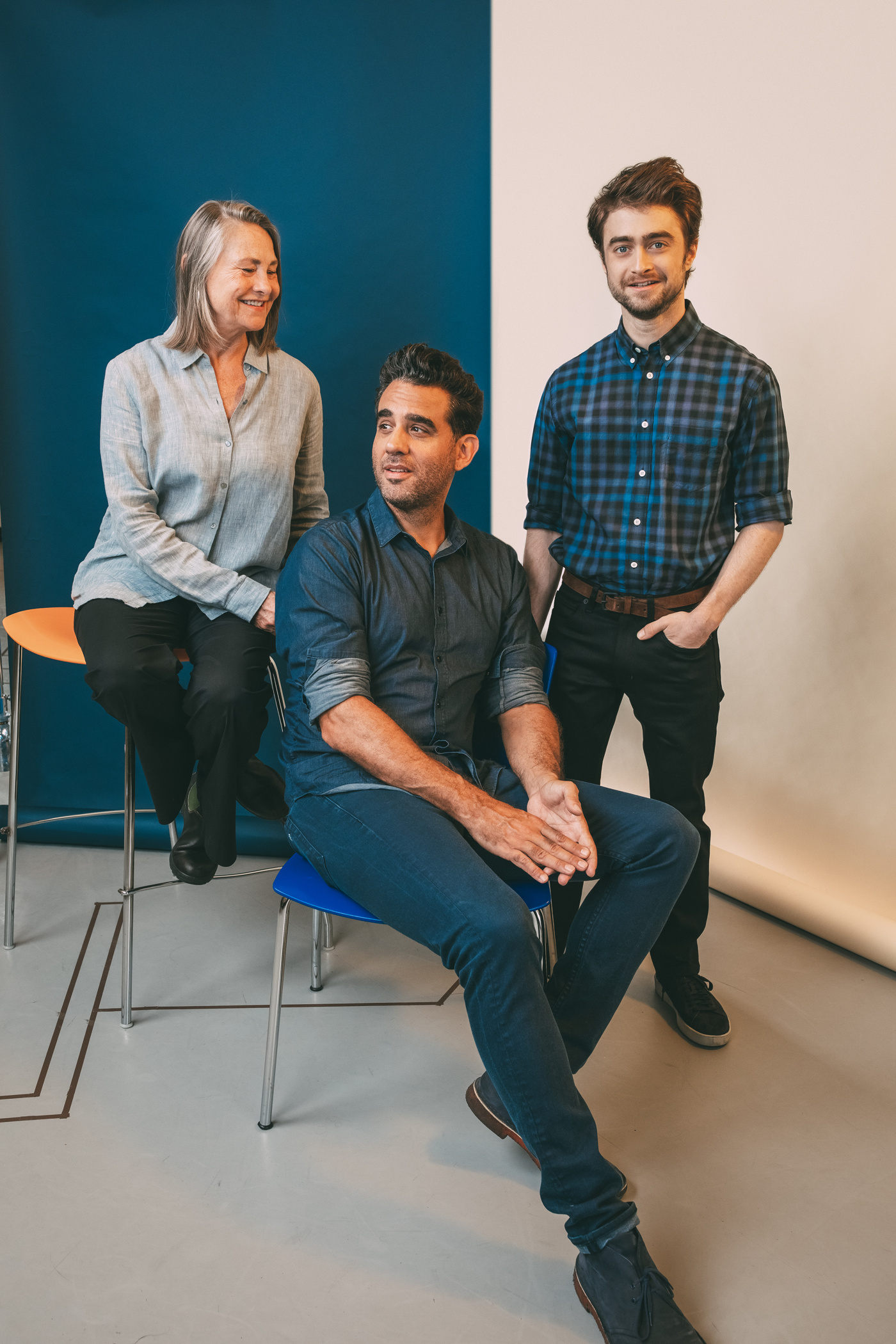
Let me first say, I’m just so excited to see the three of you in a show together. Are you fans of each other’s work?
Bobby Cannavale: Yes, totally.
Cherry Jones: Are you kidding me? Just look at them.
Bobby: I was changing my shirt yesterday, and Cherry came in and said, ‘I missed it! Can you do it again?’ So, yeah, we love each other.
Cherry: Yeah, yeah. And then I said, “Even I, a postmenopausal lesbian…"
Bobby: And I went, “You’re a lesbian?!” [Laughs.] We’ve known each other for a very long time.
Cherry: But never got to work together.
"Oh, these guys are delightful. This is gonna be a really fun play"
Bobby: I saw Cherry blow my mind years ago.
Cherry: Fact or fiction?
Bobby: Fact! Fact. 1991. First time I saw Cherry onstage. Pretty amazing. And then, you know, Dan’s f**king incredible.
Daniel Radcliffe: I got a couple of emails from these guys just before we started. Cherry emailed us both and Bobby replied. I was like, “Oh, these guys are delightful. This is gonna be a really fun play.” I was already excited about doing it, but then when you can tell you’re working with really good people? That was very exciting.
Bobby: Thank God because there’s only three of us!
Cherry: I was just gonna say that! It’s like the Musketeers. We are interdependent, like one organism, in this thing.
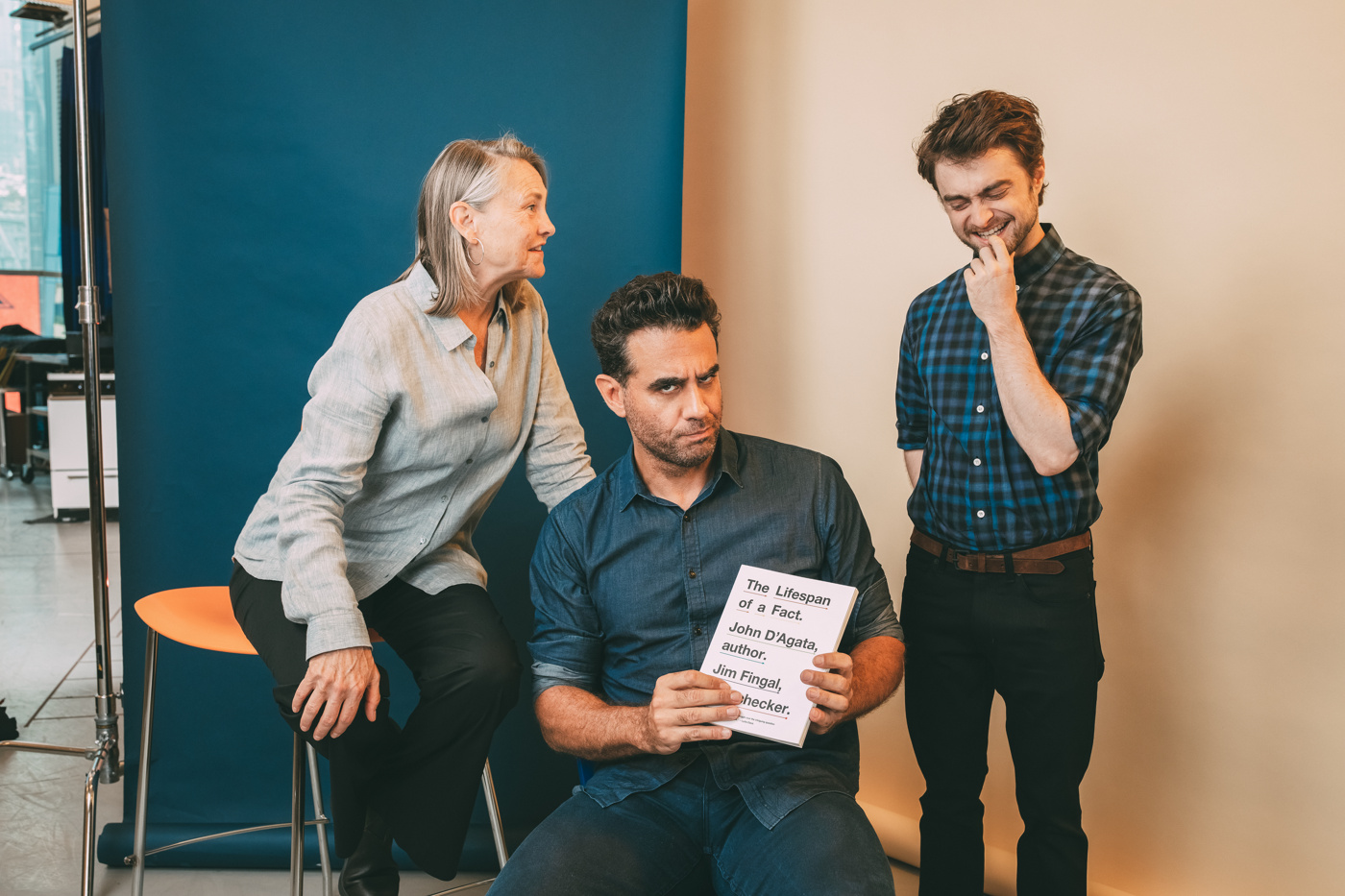
(Photo by Caitlin McNaney)
They make Broadway shows out of so many different things now. This book is definitely a fascinating property to turn into a play. Can you set up what this is as a night of theater?
Daniel: I play Jim Fingal, who’s a fact checker assigned to fact check this piece by an author who is not necessarily used to—he’s writing for a magazine with journalistic standards, and he’s not really used to having to meet those. So I get sent in to make his life hell for a few days. And Cherry plays Emily, who is trying desperately to salvage an amazing article out of the mess that I’m creating, while also stopping us from killing each other.
Bobby: They’re based on real people—John D’Agata and Jim Fingal. Through many years of putting this story together—the story of the story—[these men] have created a work that blurs the line between fact and faction, and fiction and nonfiction, truth and non-truths—half-truths—in a really delightful way that I think asks a lot of questions and doesn’t really answer any of them. When the read the book, it left me with a lot questions, questions that a lot of people in the world right now are asking themselves. Questions like who do you believe? What sources do you get information from? How much common sense should you use whenever you read something in print? Those are all questions we ask in this play.
Cherry: In a time of cutbacks in publishing, we got the feeling from both Jim and John that there are fewer and fewer fact-checking departments. So one can assume, I guess, that when you read a piece in a lesser magazine than Vanity Fair—because I’m sure they have fact checkers, right?—[you have to wonder] are you reading something that is more artistic and trying to get a greater emotional truth by not always being hardcore with facts? And is that damaging? It’s a slippery slope and I’m the lucky girl who has to make the decision in the 11th hour about whether or not the piece gets published or not.
"I don’t think Jim is dead to the artistry of what John does, but he sees it as having a much more damaging effect than a slightly less artistic piece that is absolutely true."
What does the truth mean to Jim? What drives him, Daniel?
Daniel: Jim is dogged in his pursuit of something that maybe isn’t even possible, which is to get something that is completely free from conjecture and full of empirical, factual truth. I think there’s something very noble about his quest for that, and the fact that he is so uncompromising is what make him a fun character to play. But there is something that gets lost in that, which is the beauty of John’s writing. I don’t think Jim is dead to the artistry of what John does, but he sees it as having a much more damaging effect than a slightly less artistic piece that is absolutely true.
Cherry: We were just talking the other day. It’s one of the few things I’ve ever worked on where all three characters want the same thing, versions of the same thing. [Jim] wants it to be accurate, [John] wants it to be profound and emotionally true and I just want to be able to publish it because it’s brilliant writing. But we’ve got to negotiate and figure out a way that we can do it without my credentials coming into question. So we’ve all got something at stake and we’re all working toward publication. But how are we going to get there?
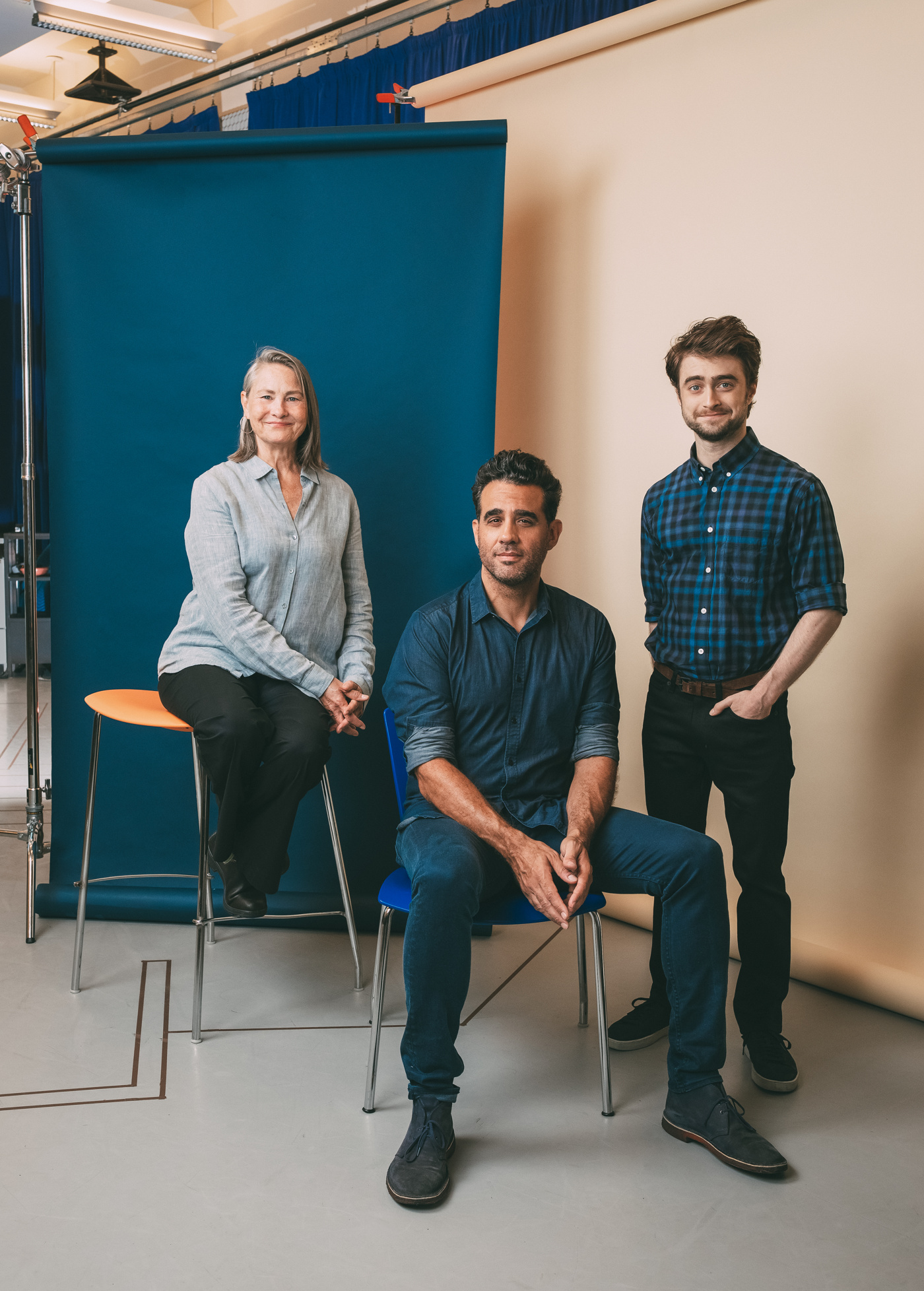
The book came out before our current administration was in office, but I think it’s fair to say this is great timing to talk about truthfulness and what’s fake and what’s real?
Bobby: Yeah.
Cherry: And how democracy survives without empirical facts. And cherry-picking facts, playing fast and loose.
Bobby: In the last 10 to 15 years, journalistic sources have increased like 100-fold. Newspapers used to tell you the news. Or at six o’clock, the evening news came on and told you. Now we don’t know the line between journalism and art. John comes from a long, old tradition of writing essays about history, and not being beholden to certain journalistic standards. And I think the line is blurred. What’s the difference between Jezebel.com and The New York Times? In my opinion, there’s a big difference. And this current administration is blurring it even more by saying, “Oh, they’re all the same. They’re all fake.”
"They fact-checked the heck out of me. Maybe because we're entertainers!"
Cherry: Bob Woodward’s book [Fear: Trump in the White House] is so fascinating because there’s so much background. We are in the age now of a bully and everyone is so terrified that they dare not go on the record.
Bobby: I love that it’s a classic journalist like Bob Woodward that’s doing this with a strong record filled with integrity.
Cherry: He’s definitely got a record, that guy. The three of us were saying the only time I’ve been fact-checked was…
Bobby: The New York Times.
Cherry: I mean, we’re just entertainers, but they fact-checked the heck out of me! Maybe because we’re entertainers. [Laughs.]
Sounds like you’ll be inspiring a lot of post-show conversations this fall…
Daniel: One of the best things about seeing plays growing up was the drive home when you’re debating it with your family. This play does ask a lot of questions and it presents lots of different ways you can feel about it through our three characters. So hopefully everybody out there in the audience will have some sort of avator for how they feel about what’s happening onstage. And that’s what’s exciting—to get people talking. On the surface, you go, “Of course facts are the thing we should be looking at.” But actually, it’s more nuanced than that. And to be able to show that argument in a fun way it’s what’s so cool.
“The Lifespan of a Fact” begins previews on September 20 and opens on October 18 at Studio 54.
